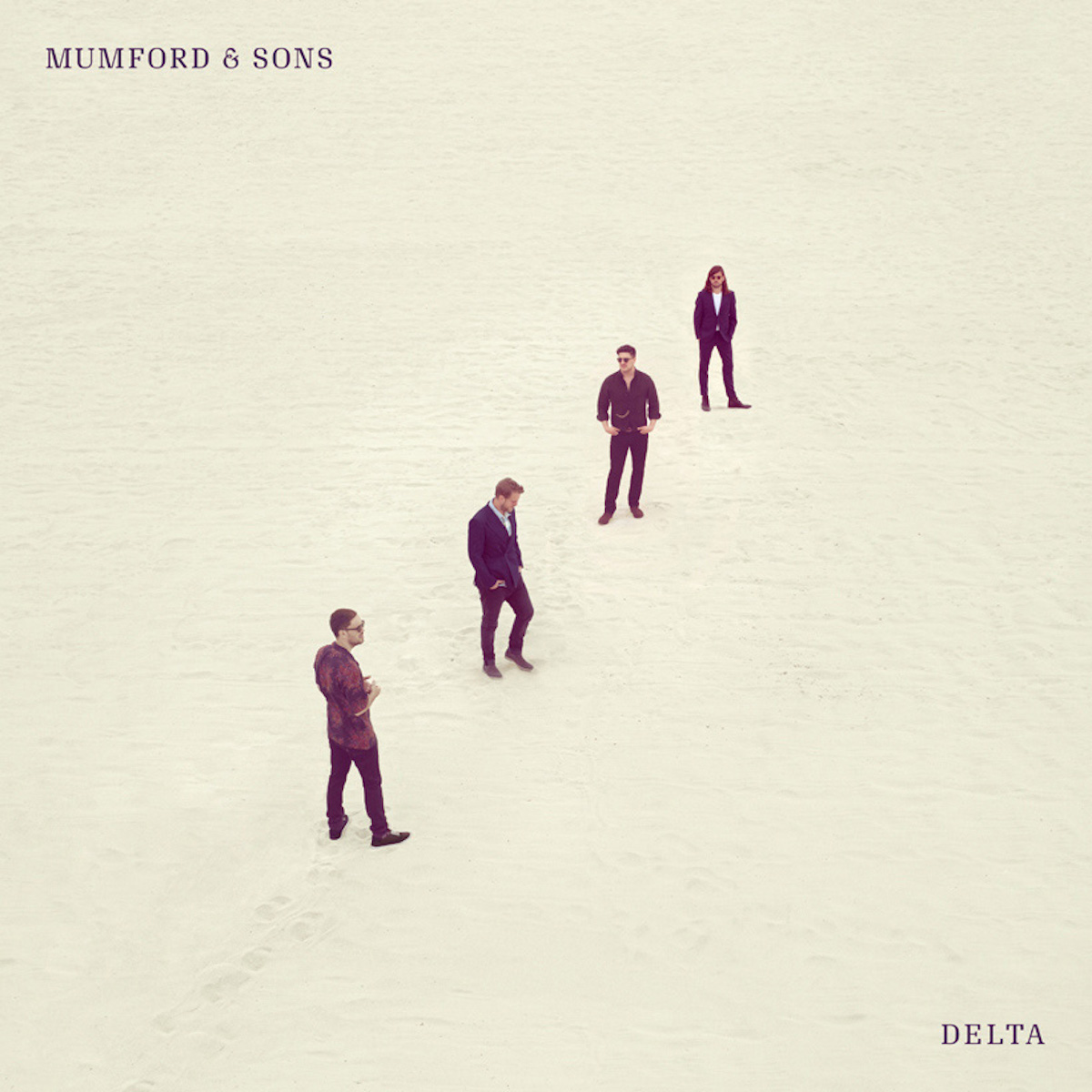After a misguided detour into atmospheric rock on 2015’s Wilder Mind underperformed critically and commercially, Mumford & Sons could have returned to the acoustic singalongs that made them famous and cranked out a catchier record. Delta indeed brings back the banjo and the big choruses, but when up-and-coming radio rock groups are more likely to experiment in Ableton than study folk music, another Sigh No More simply wouldn’t cut it.
Instead, the Mumfords’ new album takes every possible next move at once: their synth-pop record, their big-budget orchestral record, and their back-to-basics record. Working with producer Paul Epworth, who splits his time between smaller acts like Glass Animals and mega-successes like U2 and Adele, the band stretch themselves as far as possible, clinging to their folkish roots while also embracing their arena-headlining status. Mumford jokes may have been hacky in 2015, but their craving for artistic credibility stills leads them to awkward places.
The Mumfords don’t need constant overhaul to be successful, or even good, but they stretch themselves thin anyway. Opener “42,” Delta’s most overblown song, isn’t terrible live: In a lower key and without the extraneous instruments, there’s none of the strain of the studio version. On record, it plays more like a conventional movie theater converted to IMAX, cramming frantic drumming and piercing backing vocals into the same claustrophobic frame. The nadir is easily “The Wild,” with an outro so over-the-top that even the most literal-minded nature documentary music supervisor wouldn’t take the bait. “Forever” attempts to recapture the group’s old sound, until faltering over a labored refrain of “Love with your eyes / Love with your mind / Love with your… / Dare I say forever.” What might’ve been effective Sheeran-style schmaltz is sabotaged in the final chorus by the addition of a vocoder and a string-led instrumental coda. It’s a self-serious pileup of grand gestures from a band that, in the past, at least tried to evince a sense of humor.
Not that this record would be engaging stripped to its essentials—the lyrics here could barely inspire discussion among those hardcore fans still left. For all their insistence on repetitive platitudes, the Mumfords’ struggles with faith in others and in God can be compelling on a song like Babel’s “Below My Feet.” Delta’s lyrics are so vague that they’re borderline nonsensical, and weirdly mean-spirited instead of spiritual. “If I Say” is probably about being cheated on, but the phrasing takes a forced turn into Yoda-ism: “Show me your eyes / Are they drier than mine? / Your soul survives / But peace you’ll never find.” Meanwhile, “Slip Away” is straight up arrogant, as Marcus Mumford swears he “knows you better than you” and “wouldn’t have it any other way.” On Sigh No More’s “Timshel,” Mumford admitted that “I can’t move the mountains for you,” and that humility is gone on Delta.
When the band do let their guard down, the effects are immediate. Closer “Delta” is the rare moment where they create something honestly affecting. It’s actually about something, specifically fatherhood and mortality: Sound clips of Marcus Mumford and Carey Mulligan’s kids float through, “Isn’t She Lovely” style, as he sings, “When it feels like nothing else matters / Will you put your arms around me?” Despite an awkward mid-song flirtation with distorted vocals, “Delta” offers a fleeting glimpse of what this band could be if they played to their strengths instead of to the rafters. The other songs without roaring crescendos aren’t too bad either: “Wild Heart” proves stripping back to Rick Rubin-level sparseness is a good fit. “Woman” and “Picture You” hint at a quieter, more compelling record. Even lead single “Guiding Light” doesn’t need lavish orchestrations or a huge finale to be a solid folk-pop song.
The remainder of Delta feels like a mid-2000s Hans Zimmer score with lyrics added after the fact. Though the record reportedly grapples with “death, divorce, drugs, and depression,” those themes rarely come across as intended. For all the layering and experimentation, the actual attempts at visceral impact are muted; even the trademark “fuck” that’s appeared on every album to date is absent. (The would-be Delta f-bomb deployed in a socially-minded live debut; considering how many different things they’re trying here, maybe it’s best we didn’t get the Political Album too.)
“Little Lion Man,” the breakthrough single released just under a decade ago, still stands as an anomaly in the Mumford discography. Sure, the song has “hars,” “hearts,” and banjos, but it’s not aiming any higher than necessary. Compared to the bloat of the new album, it feels downright nuanced. On Delta, the scope of Mumford & Sons’ ambition is far wider than their abilities as songwriters. The result is an hour-long slog with only a few brief realizations of their old potential before the next crescendo hits.





